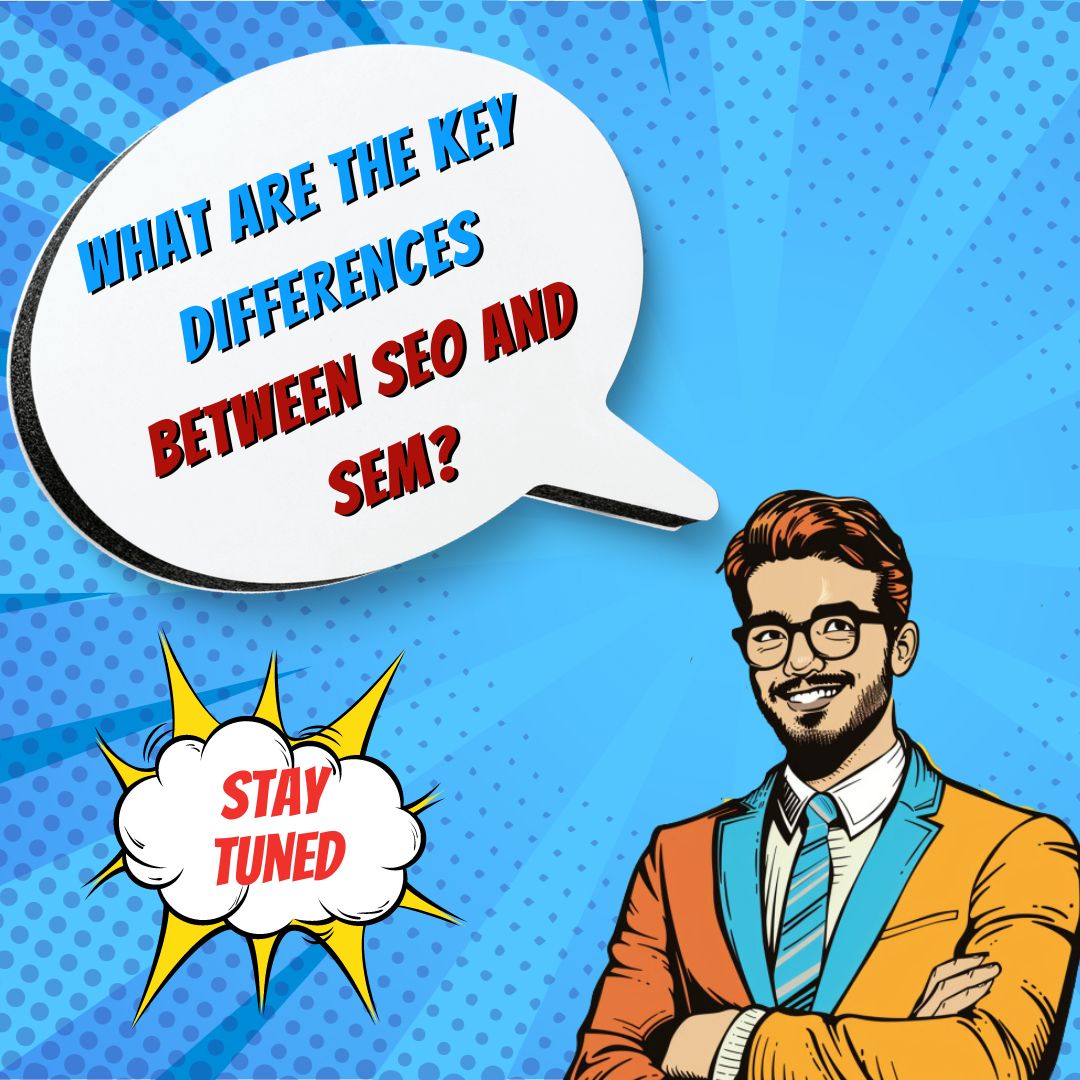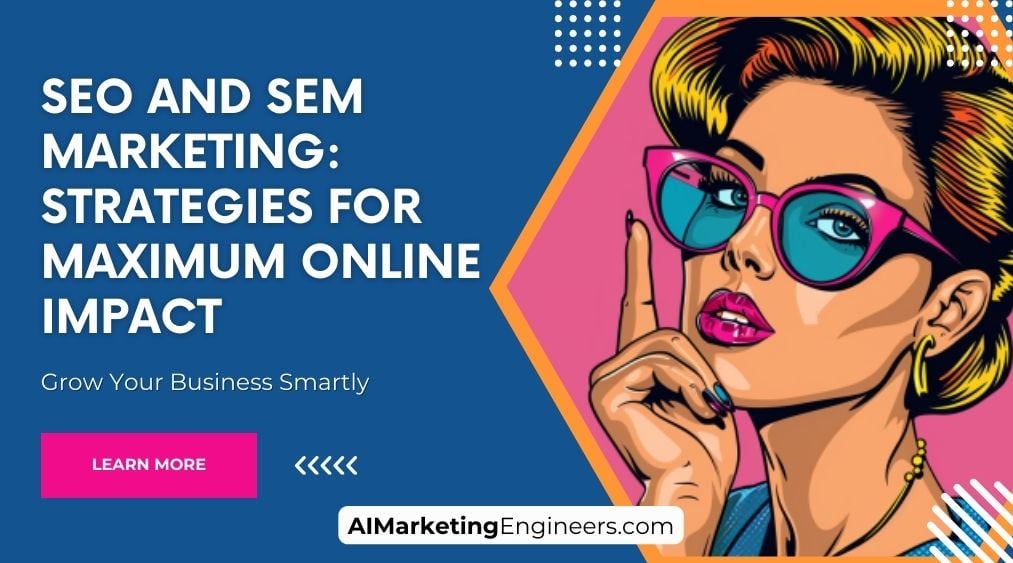Key Takeaways
✅ Definition and Focus: Dive into the world of SEO, the non-paid champion of organic search, versus SEM, the quick-fire strategist of paid ads. Understanding these can transform your online game.
✅ Synergies for Digital Marketing Success: Think of SEO and SEM as your marketing dream team. Uniting their powers can lead to the mighty goal of digital greatness – more visibility, more clicks, more conversions.
✅ Key Differences and Budget Considerations: Balance is key in the budgeting seesaw of SEO's time investment and SEM's pay-to-play model. Know where to spend and where to invest for the best returns.

Introduction
Ever wonder why some brands seem to have a magic touch online? It's not a secret, really. It's the smarts of combining two powerful forces: SEO and SEM. In today's digital jungle, it's not enough to just be good at one; mastering both could mean the difference between just getting by and truly thriving.
Is your head spinning trying to understand the wizardry of Search Engine Optimization (SEO) and the fast-paced world of Search Engine Marketing (SEM)? Do you want to be a player in this competitive landscape? Hold on tight, because we're about to journey through the land of keywords, click-through rates, and conversion optimization.
We'll dig into the weeds of organic and paid strategies that could catapult your business to new heights. Whether you're a start-up strapped for cash or a well-oiled enterprise, these insights are about to light up your digital marketing playbook.
Are you ready to explore game-changing tactics and stories of brands that have nailed it? If you're curious about how to get a better grip on this, eager to ramp up your online presence, or just want to make sure you're not leaving money on the table, then this read is for you. By the end of this, you'll be armed with not just information, but actionable insights you can apply right away – because knowing is half the battle, but doing wins the war.
Sure thing, let's break down those stats and make them sparkle! Take a seat, grab a cup of coffee, and let's chat numbers – don't worry, I'll keep it light and easy to digest.

Top Statistics
| Statistic | Insight |
|---|---|
| Global Digital Ad Spending reached $456 billion in 2021 (eMarketer) | With a pie that big, there's a slice for everyone, but only if you mix your SEO and SEM right. Can you afford to miss out on it? |
| Organic Traffic accounts for over 50% of website visits (BrightEdge) | More than half of your audience comes from organic search. This shines a spotlight on SEO, wouldn't you agree? |
| Click-Through Rate for paid search ads sits at about 2% (WordStream) | Being seen doesn't always mean being clicked. Paid ads work, but they work twice as hard with good SEO, don't you think? |
| Over 50% of searches come from mobile (Google) | Ever tried navigating a desktop site on your phone? Frustrating, right? That's why optimizing for thumbs is as crucial as for eyes. |
| 50% of searches will be voice searches by 2022 (Comscore) | We're talking to our devices more than ever. Making content that talks back, in a way, could be your next big move. Worth a thought? |
Understanding the Dynamics of SEO
Search Engine Optimization, or SEO, is essentially the art of making your website more visible to people when they’re looking around on Google or any other search engine. How does it all work? Well, think of SEO as the behind-the-scenes efforts that help your site climb up the ranks in search results. It’s all about relevance and authority. The keywords you choose and the way you use them in your titles, headings, and content make your site more relevant. Then, the external links you gain from other reputable sites act as nods of approval, boosting your site's authority. It’s a slow build, true, but once you’ve got it, it’s like having a self-sustaining source of free traffic. Ever thought about why some websites seem to answer your questions before you even fully type them out on Google? That’s SEO wizardry at work.

The Fast Track of SEM
Search Engine Marketing, or SEM, offers the express lane to visibility. By paying for ads, you essentially buy your way to the top of search results for specific keywords. It can be a great tool if you’re looking to get noticed fast. You see those ads at the top of the Google page before the list of web pages? That’s SEM in action. It’s direct, it’s instantaneous, and it’s highly measurable — you’ll know exactly what return on investment (ROI) you’re getting because tools can track who clicks on your ads and what they do on your site. Remember, though, it’s like a faucet for traffic: the flow depends on your budget. The moment you turn off the spend, the immediate visibility starts to drip away.
Harnessing SEO and SEM Together
When you blend SEO and SEM, it’s like hosting a grand feast where each dish complements the other, and the result is more delightful than having them separately. By employing both strategies, you can cover all bases. Use SEM to gain quick visibility, especially for new product launches or seasonal promotions, while steadily building your SEO. This synergy can lead to a robust online presence. The organic credibility and trust from SEO can improve the performance of your SEM campaigns, and SEM can boost traffic that supports SEO efforts. It’s a virtuous cycle. Companies that get this right tend to rise above the noise and dominate their market online.
Keeping Score of Your Marketing Success
To steer your digital marketing strategies in the right direction, you've got to measure their success. Key Performance Indicators (KPIs), such as website traffic, click-through rate, conversion rate, and customer engagement levels, give you insight into how your SEO and SEM are performing. Tools like Google Analytics and SEMrush can provide heaps of data. Are you attracting visitors? Are they sticking around and engaging with your content? And most importantly, are they converting into customers or leads? By keeping a close eye on these metrics, you can tweak and tune your campaigns for maximum impact and ensure that your efforts in SEO and SEM are not just sound and fury, signifying nothing.

The Strategic Blend of SEO and SEM
Have you ever been in a situation where you're trying to make a decision, and both options seem tempting? Well, when it comes to taking your business online, SEO and SEM are those two tempting choices—and the good news is, you don't have to choose just one. SEO is playing the long game, slowly but steadily building your brand's visibility. Like nurturing a garden, you'll work on the quality and structure of your website, craft content that answers your audience's questions, and make sure it's all so good that other sites can't help but link back to you.
SEM, on the other hand, is your quick win. It's like turning on a spotlight. Your website can get immediate traffic from paid ads on search engines like Google. These ads can be tailored to target specific types of customers based on what they're searching for, where they're located, and even their browsing habits. You can tinker with keywords and ad copy to get the most clicks for your budget.
Now, what happens when you mix the two? You get a marketing plan that covers all bases. SEO and SEM together mean you’re not only working to get more visibility in the long run, but you’re also grabbing attention right now. It’s like being seen as the neighborhood expert (thanks to your SEO efforts) while also having a flashy billboard on the main road (yep, that's your SEM shining bright).
Tailoring a Balanced Online Strategy
But how do you strike the right balance between SEO and SEM? It's like trying to find the perfect temperature—it's not too hot, not too cold, it's just right. You want to ensure your SEM campaigns complement your SEO efforts. Start by looking at your keywords. Which ones are bringing in traffic through organic search? Could you amplify this success with paid ads? Or maybe there are high-value keywords that are super competitive in organic search. SEM can give you a leg up there.
Remember, all that traffic coming in from paid ads? It's only valuable if your website is ready to convert those visitors into customers or leads. That's where SEO plays a critical role; it optimizes your site to ensure you hold onto that traffic. You'd be looking to provide a great user experience, with swift loading pages, content that hooks your visitors, and a clear call to action.

AI Marketing Engineers Recommendation
Recommendation 1: Invest in Long-Term Equity with SEO: SEO isn't a quick fix. It's like planting a seed and nurturing it into a tree. Start with a robust keyword strategy tied to your content. Did you know that the top Google search result has a nearly 35% click-through rate? To climb those ranks, focus on high-quality, relevant content and a smooth, fast web experience. Over time, you'll grow a presence that can reduce your paid search costs and increase organic trust.
Recommendation 2: Balance Your Portfolio with SEM: Imagine you've got a sale that won't last. Can you wait for SEO to catch up? Not a chance. That's where SEM steps in. Use paid ads to give visibility to time-sensitive promotions or get on top quickly in competitive markets. The trend is clear: businesses are likely to earn $2 for every $1 they spend on Google Ads. Carry out segmented and targeted AdWords campaigns to go along with your SEO tree, and you've got a garden that blooms all year round.
Recommendation 3: Leverage Analytics to Fine-Tune Your Approach: Ever tried fitting a square peg in a round hole? That's marketing without data. Use tools like Google Analytics and SEMrush to understand your audience's behavior and campaign performance. These platforms can tell you what's resonating with your audience, allowing you to refine your SEO and SEM strategies. Why waste shots in the dark when you can aim with precision at what works?

Conclusion
So, we've taken a stroll down the busy streets of digital marketing and peeked into the shop windows of SEO and SEM. You see, these aren't just fancy abbreviations to throw around in meetings. No, they're more like the bread and butter of getting noticed online in a world that's always blinking with new content.
Imagine SEO, with its organic charm, like a garden. It’s something you nurture; it grows over time, right? You’ve learned how it relies on stuff like keywords and backlinks to slowly but surely draw folks in. It's the long game, the kind that rewards patience with sustainable growth and trust from your audience.
Now picture SEM as that flashy billboard you rent out on the highway. It's quick, it’s visible, and if you're smart about it, it can get your name out there instantly. But it has a price tag, so you've got to keep an eye on those budgets and numbers to make sure you’re getting your money's worth.
But here’s a little secret: It's not an either-or situation. The real magic happens when you mix them up. That’s the synergy we’re talking about, where SEO and SEM shake hands and work together. You create a strategy that captures attention right now and keeps it in the long run.
Think of those success stories we chatted about – businesses that have managed to dominate both the billboards and the backyards. They track their progress, chop and change what doesn’t work, and double down on what does.
So, what about you? Are you ready to do a little gardening, hang up some bright signs, and watch as your business catches the eye of passersby from both the slow, scenic route and the fast lane? Roll up your sleeves, my friend, because the journey to digital marketing triumph is all about finding that sweet spot between the organic allure of SEO and the bright lights of SEM. Why not start today and see where it takes you?

FAQs
Question 1: What is SEO?
Answer: Think of it as making your website as appealing as possible to the all-knowing search engines out there, without paying directly for visibility. It's about using research, content finesse, technical tweaks, and building relationships to naturally attract visitors to your site.
Question 2: What is SEM?
Answer: This time, you're putting your hand in your pocket and saying, "I'll pay for some spotlight, please." So, you buy ads that pop up when folks search for stuff related to what you offer. It's all about getting those ads to show up at the right time and the right place.
Question 3: How do SEO and SEM differ?
Answer: It boils down to how you're getting eyes on your site – earning your way to the top spot with SEO or buying your way into the limelight with SEM. They both want to get you visitors; they just take different routes.
Question 4: Can I use both SEO and SEM together?
Answer: Absolutely! It's like having a peanut butter and jelly sandwich – each is good on its own, but together, they’re a classic combo. SEO and SEM can help you cover more ground and reach out to different crowds at the same time.
Question 5: Which one should I prioritize: SEO or SEM?
Answer: Tough one! Think about what you need right now. Got time and want lasting results? SEO is your friend. Need a quick boost and have some dollars to invest? Hello, SEM. Though, if you can juggle both, why not, right?
Question 6: What are some advanced SEO techniques?
Answer: If you're ready to go beyond the basics, you can explore high-level wizardry like tweaking your site's backend, conquering the local search scene, talking the way people speak to their smart devices, and shaking hands with influencers to spread your online charm.
Question 7: What are some advanced SEM techniques?
Answer: For those who want to play with the big kids, you can experiment with laser-focused targeting options, clever ads that chase people around the internet, smart bidding that lets machines do the hard numbers work, and squeezing AI for all its worth to keep those ads sharp.
Question 8: How do I measure the success of my SEO and SEM efforts?
Answer: How do you know if you're winning? Keep an eye on the score – online traffic, where you rank in searches, whether people are clicking and buying, and if the money you're spending is paying off. Good old-fashioned tracking tools like Google Analytics can be your best pals here.
Question 9: Are there any common mistakes to avoid when implementing SEO and SEM?
Answer: Beware of the traps! Skipping homework on keywords, ignoring the people on smartphones, only going after the obvious keywords, and setting wild expectations can trip you up. And remember, this isn't a set-it-and-forget-it game – keep tweaking for the gold.
Question 10: Where can I learn more about best practices for SEO and SEM?
Answer: There's a treasure trove of knowledge waiting for you! Websites like Moz and Search Engine Land are like libraries filled with SEO and SEM secrets. Plus, there are courses, webinars, and books galore. Keeping your ear to the ground by following the big thinkers in the field can give you the edge.

Academic References
- Smith, C. (2013). Search Engine Advertising: Understanding Searchers. Search Engine Watch. Retrieved from www.searchenginewatch.com. In this article, Smith sheds light on the significance of understanding searcher intent, and how SEO and SEM play distinct yet complementary roles in a comprehensive search engine marketing strategy.
- Wu, J., Lu, F., Chen, H., Lu, W. (2014). The Relationship Between Organic and Paid Search: A Literature Review. Journal of Service Research, 17(3), 310-323. This literature review painstakingly explores the symbiotic relationship between SEO and SEM, discussing how each can amplify the other and detailing the difficulties inherent in parsing their interwoven effects.
- Kim, L. (2018). SEO vs PPC: Which One Should You Focus On? Retrieved from neilpatel.com. Larry Kim offers a deep dive into the merits and uses of SEO versus SEM, encouraging marketers to carefully balance the two to achieve maximum visibility and efficiency in reaching their audience.
- Liu, C., Feng, R., Wei, K. K. (2011). An Empirical Study of the Effectiveness of Search Engine Marketing Investment. International Journal of Electronic Commerce, 16(2), 7-38. This paper presents real-world ecommerce data to assess the return on investment of SEM, unearthing the vital impact it has on bolstering organic traffic and highlighting the interplay between SEO and SEM tactics.






